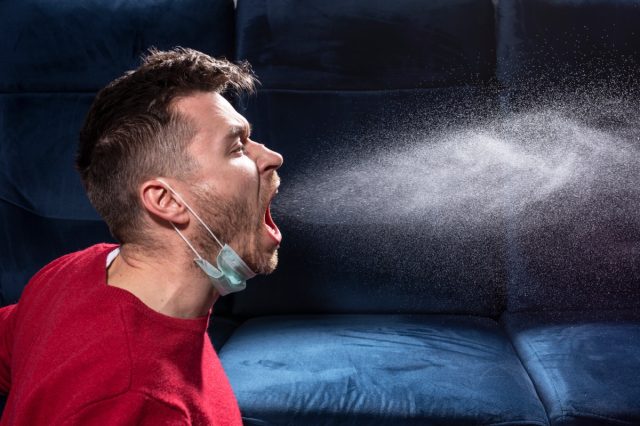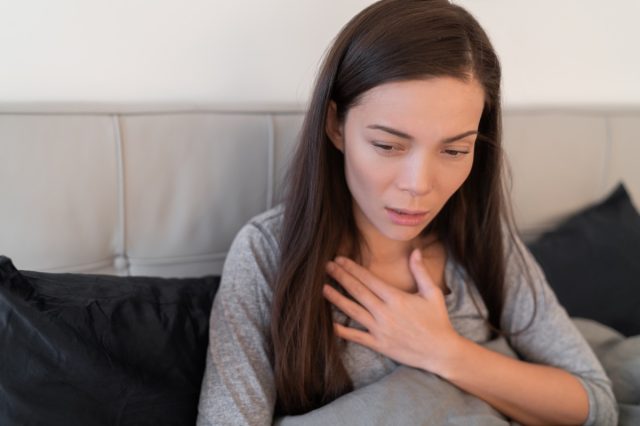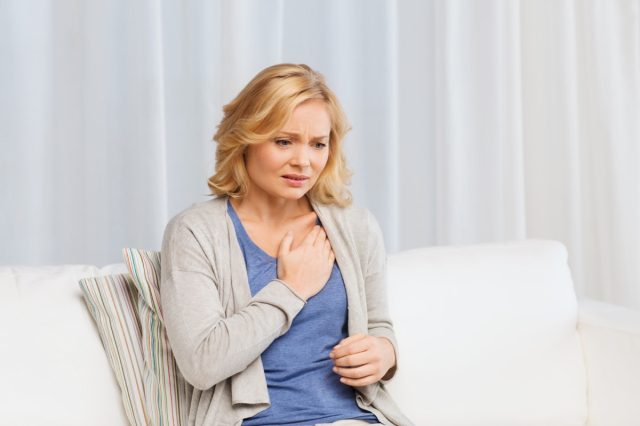News came yesterday that Pelé, the iconic soccer star, died "due to multiple organ failures resulting from the progression of colon cancer associated with his previous medical condition," according the the hospital where he was undergoing treatment. The news came shortly after he was hospitalized for a respiratory infection. Respiratory infections are spreading worldwide now, as COVID, RSV and Strep A cases rise. "It is 'highly likely' that respiratory viruses could spread even more following holiday gatherings and New Year's Eve celebrations, Dr. William Schaffner, a professor in the Division of Infectious Diseases at Vanderbilt University Medical Center and medical director of the National Foundation for Infectious Diseases, told CNN," says the network. How can you tell you have a respiratory infection? Read on for the symptoms.
You May Cough

A respiratory infection is a condition that affects the respiratory system, which includes the nose, throat, bronchi, and lungs. It can be caused by a variety of viruses, bacteria, or other microorganisms, and it can range in severity from a mild cold to a severe pneumonia. A persistent cough is a common symptom of a respiratory infection. The cough may be dry or productive, meaning it produces mucus or phlegm.
You May Have a Sore Throat

A sore throat is often accompanied by a respiratory infection and may be accompanied by difficulty swallowing. COVID-19, the disease caused by the novel coronavirus, can cause a sore throat as a symptom. The virus is primarily spread through respiratory droplets, and infection can cause inflammation of the throat and other respiratory tissues.
A sore throat is often a symptom of a respiratory infection, and it can be caused by a variety of viruses.
You May Have Congestion

Nasal congestion, also known as a stuffy nose, is a common symptom of a respiratory infection. You may also experience a runny nose or postnasal drip.
You May Have a Fever

A fever is a common symptom of a respiratory infection and is usually accompanied by chills, sweats, and body aches. The normal body temperature for most people is around 98.6°F (37°C). A fever is generally considered to be present when the body temperature is above 100.4°F (38°C).
Fevers can be caused by a variety of things, including infections, inflammation, and other medical conditions. In most cases, a fever is a sign that the body is fighting off an infection or other illness. Fevers can help to kill off viruses and bacteria, and they can also help to stimulate the immune system.
You May Have Shortness of Breath

If you are having difficulty breathing or feel short of breath, this may be a sign of a more severe respiratory infection such as pneumonia or COVID. Respiratory syncytial virus (RSV) is a respiratory virus that can cause symptoms ranging from mild to severe. Shortness of breath is a common symptom of RSV infection, particularly in people with underlying lung conditions or weakened immune systems.
There are several reasons why you may be experiencing shortness of breath after an RSV infection. One possibility is that the virus has caused inflammation in your airways, making it difficult for air to flow in and out of your lungs. Another possibility is that the infection has caused fluid to accumulate in your lungs, which can also cause shortness of breath.
It is important to see a healthcare provider if you are experiencing shortness of breath after an RSV infection, as this may indicate a more serious complication of the infection. They will be able to determine the cause of your symptoms and recommend appropriate treatment. In the meantime, try to rest as much as possible and drink plenty of fluids to help your body recover from the infection.
You May Have Chest Pain

Chest pain is another possible symptom of a respiratory infection, especially if it is accompanied by shortness of breath or coughing.
If you are experiencing any of these symptoms and suspect you may have a respiratory infection, it is important to seek medical attention. Your healthcare provider can diagnose the cause of your symptoms and recommend the appropriate treatment. This may include medications to help alleviate your symptoms and help you recover more quickly.
It is also important to practice good respiratory hygiene to prevent the spread of respiratory infections. This includes washing your hands frequently, covering your mouth and nose when you cough or sneeze, and avoiding close contact with people who are sick. By taking these precautions, you can help protect yourself and others from respiratory infections.
No comments:
Post a Comment